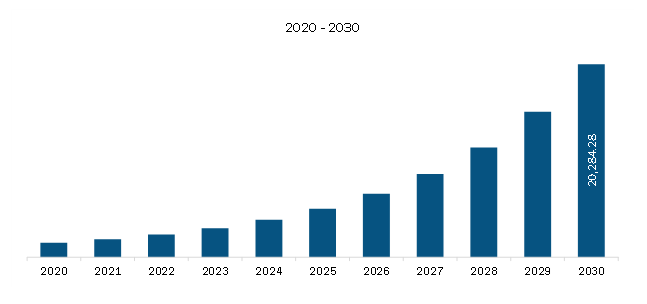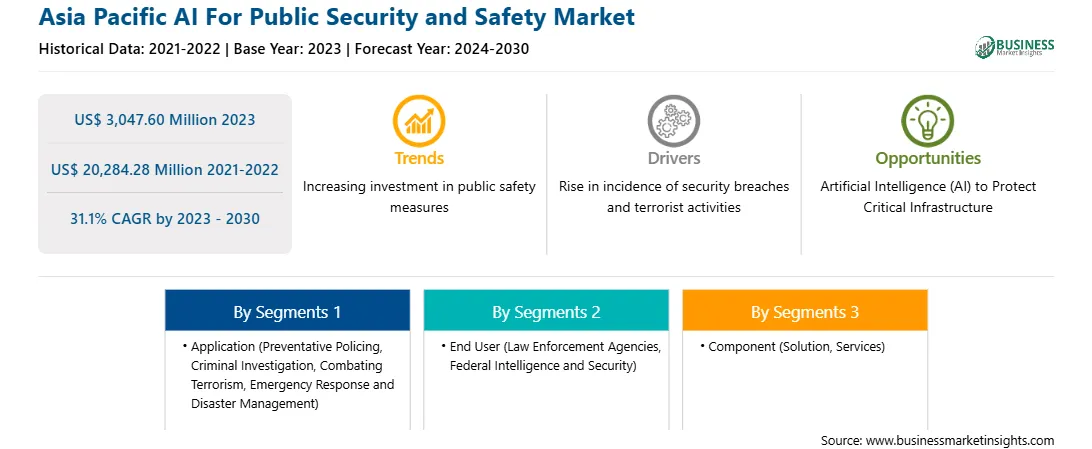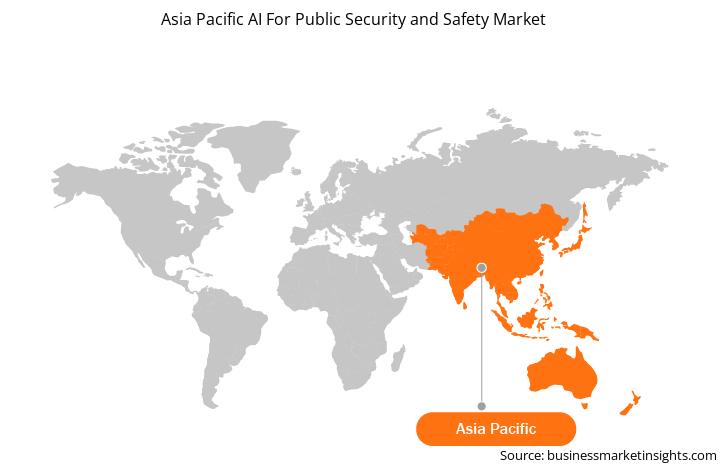Asia Pacific AI For Public Security and Safety Market
No. of Pages: 154 | Report Code: BMIRE00028722 | Category: Technology, Media and Telecommunications
No. of Pages: 154 | Report Code: BMIRE00028722 | Category: Technology, Media and Telecommunications
City corporations and authorities are modifying their processes, technological capabilities, and approaches to serve citizens efficiently and meet the ever-changing needs of societies. Artificial intelligence (AI) can improve the processes defined to detect security risks and effectively respond to them. Advancements in video surveillance technology can also yield productive results. In smart cities, AI-integrated technologies are often employed to perform tasks that humans would otherwise find difficult. Besides, a smart city is a fast-growing concept in urban setups, combining technology and innovation to improve citizens' quality of life and promote sustainability. According to Abdalslam, global investment in smart city technologies reached US$ 158 billion in 2022, and it is expected to reach US$ 158 billion by 2025. The Japan have 10 and 8 smart cities, respectively. Video surveillance has become a popular way of monitoring traffic stops, preventing & solving crimes, and protecting houses. Moreover, China accounts for more than 50% of video surveillance systems supplied worldwide. The prime purposes served by these systems include crowd estimation, weapon detection, critical hardware failure identification, investigation aids, and congestion reduction (to improve people and vehicle flow). AI-powered video analytics aid in the intelligent and accurate classification of objects (people, cars, etc.) and navigation on roads. When machines tag data in live and recorded video, responders and investigators can identify the people, objects, or movements more quickly and easily, saving hours of trawling through surveillance footage. Such data insights can save the lives of first responders and civilians during emergencies.
Public safety is much more than law enforcement and emergency responses, and it also includes proactive measures taken by cities to prevent different incidents and mishaps. For instance, the University of Tennessee in Chattanooga conducted research to better understand the reasons for road accidents and ways of preventing them. With the help of multiple sensors and historical data, the Center for Urban Informatics and Progress of this university developed an AI-based model that could be used to predict accidents and improve resource planning and deployment to manage crises and avoid accidents. The data was shared on a map-based collaboration platform where organizations across the city—from emergency service departments to the Department of Transportation—could access the model, view the results, and plan accordingly. Security systems help respond to incidents and enhance safety measures while providing information to the stipulated authorities to improve operations and overall experiences. The system architecture consists of AI modules with machine learning (ML) algorithms, IoT technology and sensors, smart drones, intelligent video surveillance, data analysis, and cybersecurity modules, which can efficiently protect citizens and their data from criminals while providing high speed and accuracy. Therefore, the growing number of smart cities, transit organizations, and public-facing businesses are expected to boost the Asia Pacific AI for public security and safety market.
In 2022, government of various countries in Asia Pacific spent approximately US$ 17 billion on artificial intelligence systems, and the spending is expected to reach US$ 32 billion by 2025. By 2025, state/local governments are expected to be the second highest spender on AI solutions, focusing on public safety and emergency response, augmented threat intelligence, and prevention systems. Thus, the increasing investment in the utilization of AI for public safety is fueling the growth of the market in the region. In Asia Pacific, AI enables public safety agencies to work more safely and efficiently by simplifying manual and repetitive tasks. In 2018, Asia Pacific suffered greater impacts from natural disasters than any other region. Munich Re, a reinsurance firm, found that 75% of all deaths from natural disasters globally occurred in Asia and accounted for 43% of all international events. Hence, to determine the upcoming natural disaster in the region, AI technology is used to predetermine the changes in the environment. According to a report by Control Risks, a global risk consultancy, terrorism remained a threat in Asia Pacific as the number of attacks doubled between 2013 and 2018. In this environment, law enforcement authorities seek new technology solutions to help keep communities safe and secure. AI, in case of terrorism, is used to monitor the activities of the terrorist and detect the ammunition used by them. As per analysis, smart city spending across Asia Pacific, excluding Japan, reached around US$ 35 billion in 2019, with data-driven, public safety projects listed among the top investment priorities. Smart cities use AI video surveillance technology to monitor the activities that can lead to criminal activities in the cities. Therefore, the growing investment in the development of smart cities is fueling the growth of the Asia Pacific AI for public security and safety market. Governments of various countries in APAC are investing heavily in developing their own homegrown AI capabilities by financing research and development and deployment efforts. Countries such as Australia, New Zealand, and South Korea are developing coordinated local and national strategies, while other countries such as Indonesia, Malaysia, and Thailand are adopting a more collaborative approach with private-sector players to develop their AI. The above-mentioned factors are fueling the growth of the Asia Pacific AI for public security and safety market in Asia Pacific.
Strategic insights for the Asia Pacific AI For Public Security and Safety provides data-driven analysis of the industry landscape, including current trends, key players, and regional nuances. These insights offer actionable recommendations, enabling readers to differentiate themselves from competitors by identifying untapped segments or developing unique value propositions. Leveraging data analytics, these insights help industry players anticipate the market shifts, whether investors, manufacturers, or other stakeholders. A future-oriented perspective is essential, helping stakeholders anticipate market shifts and position themselves for long-term success in this dynamic region. Ultimately, effective strategic insights empower readers to make informed decisions that drive profitability and achieve their business objectives within the market. The geographic scope of the Asia Pacific AI For Public Security and Safety refers to the specific areas in which a business operates and competes. Understanding local distinctions, such as diverse consumer preferences (e.g., demand for specific plug types or battery backup durations), varying economic conditions, and regulatory environments, is crucial for tailoring strategies to specific markets. Businesses can expand their reach by identifying underserved areas or adapting their offerings to meet local demands. A clear market focus allows for more effective resource allocation, targeted marketing campaigns, and better positioning against local competitors, ultimately driving growth in those targeted areas.
Asia Pacific AI For Public Security and Safety Strategic Insights

Asia Pacific AI For Public Security and Safety Report Scope
Report Attribute
Details
Market size in 2023
US$ 3,047.60 Million
Market Size by 2030
US$ 20,284.28 Million
Global CAGR (2023 - 2030)
31.1%
Historical Data
2021-2022
Forecast period
2024-2030
Segments Covered
By Application
By End User
By Component
Regions and Countries Covered
Asia-Pacific
Market leaders and key company profiles
Asia Pacific AI For Public Security and Safety Regional Insights

Asia Pacific AI for Public Security and Safety Market Segmentation
The Asia Pacific AI for public security and safety market is segmented into application, end user, component, and country.
Based on application, the Asia Pacific AI for public security and safety market is segmented into preventative policing, criminal investigation, combating terrorism, emergency response and disaster management, and others. In 2023, the preventative policing segment registered a largest share in the Asia Pacific AI for public security and safety market.
Based on component, the Asia Pacific AI for public security and safety market is bifurcated into solution and services. In 2023, the solution segment registered a larger share in the Asia Pacific AI for public security and safety market.
Based on end-use industry, the Asia Pacific AI for public security and safety market is segmented into law enforcement agencies, federal intelligence and security, and others. In 2023, the law enforcement agencies segment registered a largest share in the Asia Pacific AI for public security and safety market.
Based on country, the Asia Pacific AI for public security and safety market is segmented China, Japan, India, South Korea, Australia, and the Rest of Asia Pacific. In 2023, China segment registered a largest share in the Asia Pacific AI for public security and safety market.
Atos SE, Hexagon AB, Hitachi Ltd, Honeywell International Inc, International Business Machines Corp, Motorola Solutions Inc, Thales SA, Voyager Labs Ltd, and XenonStack Pvt Ltd are the leading companies operating in the Asia Pacific AI for public security and safety market.
The Asia Pacific AI For Public Security and Safety Market is valued at US$ 3,047.60 Million in 2023, it is projected to reach US$ 20,284.28 Million by 2030.
As per our report Asia Pacific AI For Public Security and Safety Market, the market size is valued at US$ 3,047.60 Million in 2023, projecting it to reach US$ 20,284.28 Million by 2030. This translates to a CAGR of approximately 31.1% during the forecast period.
The Asia Pacific AI For Public Security and Safety Market report typically cover these key segments-
The historic period, base year, and forecast period can vary slightly depending on the specific market research report. However, for the Asia Pacific AI For Public Security and Safety Market report:
The Asia Pacific AI For Public Security and Safety Market is populated by several key players, each contributing to its growth and innovation. Some of the major players include:
The Asia Pacific AI For Public Security and Safety Market report is valuable for diverse stakeholders, including:
Essentially, anyone involved in or considering involvement in the Asia Pacific AI For Public Security and Safety Market value chain can benefit from the information contained in a comprehensive market report.